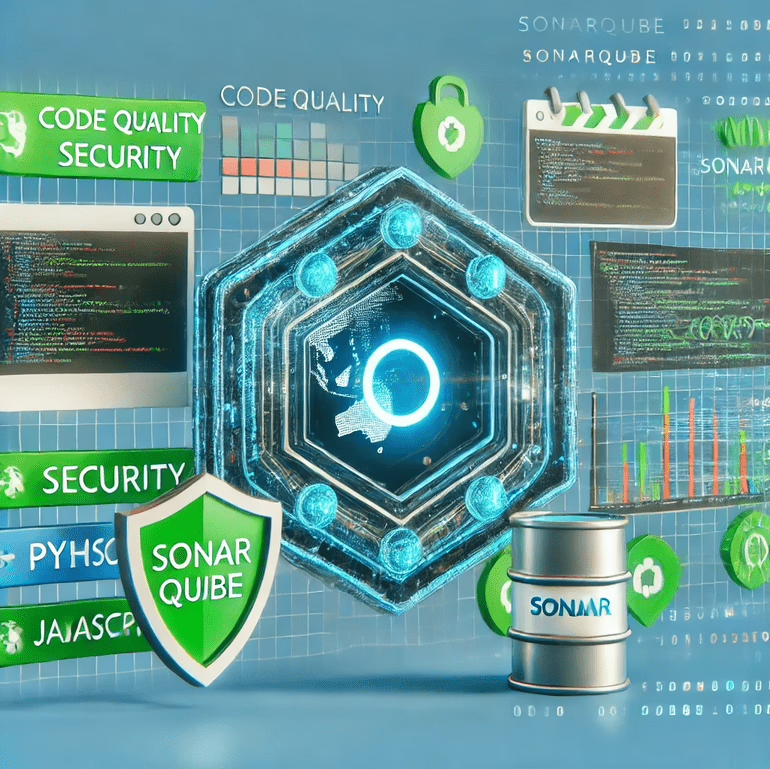In the fast-paced world of software development, maintaining high code quality is more crucial than ever. With increasing pressure to deliver software quickly, teams often struggle to balance speed with the need for clean, maintainable, and secure code. This is where SonarQube, an open-source platform for continuous code quality inspection, becomes indispensable. SonarQube not only helps identify and fix issues in your code but also ensures adherence to coding standards, ultimately improving the maintainability and reliability of software projects.
The Growing Need for Code Quality in Modern Development
Code quality is more than just a metric—it’s a reflection of how well software can be maintained, extended, and secured over time. Poor code quality can lead to technical debt, increased costs, and even security vulnerabilities that may compromise the integrity of entire systems. As software becomes increasingly complex and distributed across various platforms and languages, maintaining a high standard of code quality is vital.
SonarQube has emerged as a leader in the field of static code analysis, providing development teams with the tools they need to continuously inspect and improve their codebases. By integrating SonarQube into your development processes, you can proactively address code quality issues, ensuring that your software remains robust and secure.
Introduction to SonarQube: The Ultimate Code Quality Tool
SonarQube, initially known as Sonar, has evolved into a comprehensive platform for continuous inspection of code quality. It is widely used by development teams across the globe to identify code issues, enforce coding standards, and enhance software security. Here’s a closer look at some of SonarQube’s key features and capabilities:
1. Static Code Analysis
SonarQube performs static code analysis by scanning the source code of software projects. It identifies a wide range of code quality and security issues, such as:
- Code Smells: Poor coding practices that may lead to maintenance issues.
- Bugs: Actual or potential errors in the code.
- Vulnerabilities: Security flaws that could be exploited by attackers.
- Security Hotspots: Areas of the code that require further review to assess their security implications.
By analyzing code before it’s deployed, SonarQube helps teams catch and address issues early in the development process.
2. Support for Multiple Languages
SonarQube is truly versatile, supporting a broad array of programming languages, including Java, C/C++, C#, Python, JavaScript, TypeScript, Ruby, and more. This multi-language support makes SonarQube an excellent choice for polyglot environments, where different languages are used across various parts of a project.
3. Code Quality Metrics
One of SonarQube’s standout features is its ability to provide detailed code quality metrics. These metrics include:
- Complexity: Measures the complexity of the code, which can indicate areas that may be difficult to maintain.
- Duplications: Identifies redundant code, which can be removed or refactored to improve efficiency.
- Maintainability: Assesses how easy it is to maintain and extend the codebase.
- Adherence to Coding Standards: Ensures that the code follows established coding conventions and best practices.
These metrics are visualized through interactive dashboards, helping development teams to continuously monitor and improve their code quality.
4. Integration with Build Pipelines
SonarQube integrates seamlessly with continuous integration/continuous deployment (CI/CD) pipelines. By integrating SonarQube into your build process, you can automate code quality checks, ensuring that any issues are identified and addressed before they make it into production. This automation is crucial for maintaining high code quality in fast-paced development environments.
5. Customizable Rules and Profiles
Every software project is unique, with its own set of coding standards and requirements. SonarQube allows you to define custom quality profiles and rules, tailoring the analysis to your specific needs. This flexibility enables organizations to enforce their own coding guidelines, ensuring that all code adheres to internal and external standards.
6. Issue Tracking and Management
Identified code issues are logged within the SonarQube interface, where they can be viewed, prioritized, assigned, and tracked. This feature simplifies the process of addressing and resolving code quality problems, providing a clear path from identification to resolution.
7. Security Vulnerability Scanning
In addition to code quality, SonarQube also focuses on security. The platform can identify security vulnerabilities and hotspots in your codebase, making it a valuable tool for improving the overall security of your software projects. This dual focus on quality and security ensures that your code is both robust and resilient.
8. Technical Debt Estimation
SonarQube calculates the technical debt of a codebase based on the identified issues and the effort required to fix them. Technical debt represents the future cost of reworking code that was developed quickly but inefficiently. By quantifying technical debt, SonarQube helps teams understand the long-term impact of their coding decisions.
9. Integration with IDEs
SonarLint, an extension for popular integrated development environments (IDEs) like Visual Studio Code, IntelliJ IDEA, and Eclipse, allows developers to run code analysis directly within their development environment. This integration ensures that developers can identify and address issues as they code, fostering a culture of continuous improvement.
10. Community and Plugins
SonarQube has a vibrant community and a marketplace of plugins that extend its functionality. These plugins can add support for additional languages or integrate with other development tools, providing a tailored experience that meets the specific needs of your project.
11. Reporting and Dashboards
SonarQube’s interactive dashboards and detailed reports provide real-time insights into code quality and track improvements over time. These reports can be shared with stakeholders, ensuring that everyone is aligned on the current state of the codebase.
12. Branch Analysis
SonarQube supports the analysis of different branches in version control systems, allowing developers to assess code quality on feature branches and pull requests. This feature is essential for maintaining high standards across all aspects of the development lifecycle.
The Business Impact of SonarQube: Why Enterprises Need It
For businesses, SonarQube offers more than just code quality assurance; it provides a strategic advantage. High-quality code reduces the likelihood of bugs, security vulnerabilities, and maintenance issues, all of which can lead to costly rework and delays. By adopting SonarQube, enterprises can:
- Reduce Technical Debt: By identifying and addressing issues early, teams can reduce the accumulation of technical debt, which can save significant time and resources in the long run.
- Improve Security: With its robust security scanning capabilities, SonarQube helps organizations protect their software from potential threats, safeguarding both their reputation and their customers’ data.
- Enhance Maintainability: Code that is easier to maintain and extend allows organizations to be more agile, responding more quickly to market changes and customer needs.
- Ensure Compliance: By enforcing coding standards and best practices, SonarQube helps organizations meet internal and external compliance requirements, reducing the risk of legal and regulatory issues.
Curate Consulting Services: Connecting You with the Right Talent for SonarQube
At Curate Consulting Services, we understand that implementing and managing tools like SonarQube requires specialized knowledge and skills. That’s why we’re dedicated to connecting you with the talent you need to succeed. Whether you’re looking for experts in static code analysis, security vulnerability scanning, or CI/CD integration, we have the resources to meet your needs.
Specialized Talent for SonarQube Implementation
Implementing SonarQube effectively requires more than just installing the software—it requires a deep understanding of best practices in code quality and security. Our team at Curate Consulting Services can help you find professionals who are skilled in:
- Code Quality Analysis: Experts who can configure SonarQube to meet your specific needs, ensuring that your codebase is continuously monitored for quality issues.
- Security Assessment: Professionals who can leverage SonarQube’s security scanning capabilities to protect your software from vulnerabilities.
- CI/CD Integration: Engineers who can seamlessly integrate SonarQube into your existing build pipelines, automating the process of code quality checks.
Why Choose Curate Consulting Services?
When it comes to finding the right talent, Curate Consulting Services stands out for its commitment to excellence. We take the time to understand your unique challenges and provide tailored solutions that address your specific needs.
- Industry Expertise: With decades of experience in the technology sector, we have a deep understanding of the challenges faced by modern development teams.
- Quality Assurance: We are dedicated to providing the highest quality talent, ensuring that you have the skills and expertise needed to succeed.
- Tailored Solutions: We understand that every organization is different, which is why we offer customized staffing solutions that align with your goals.
Conclusion
SonarQube is more than just a tool—it’s a comprehensive solution for managing code quality and security in software development. By integrating SonarQube into your development processes, you can ensure that your codebase remains robust, maintainable, and secure. Whether you’re a developer looking to improve your code quality or an enterprise leader seeking to enhance your software’s security, SonarQube provides the tools you need to succeed.



